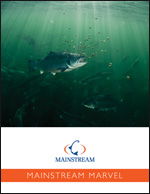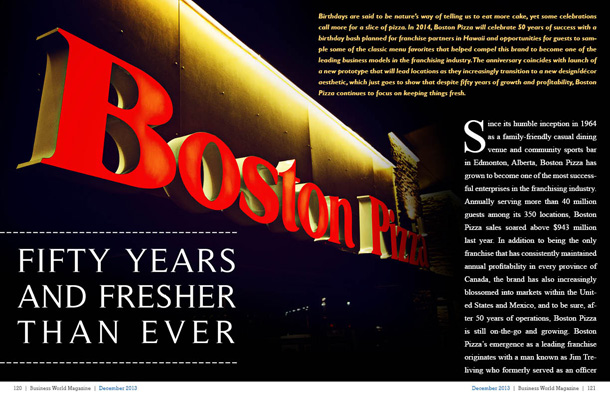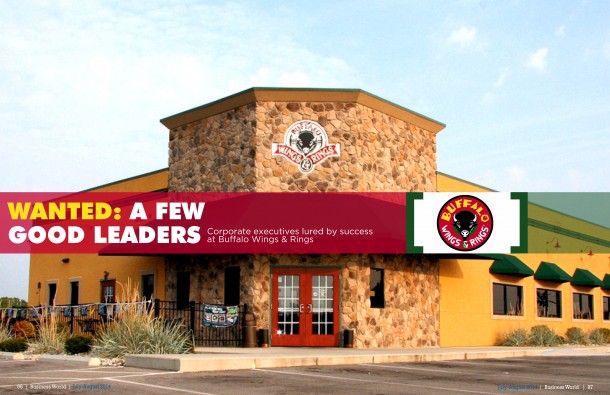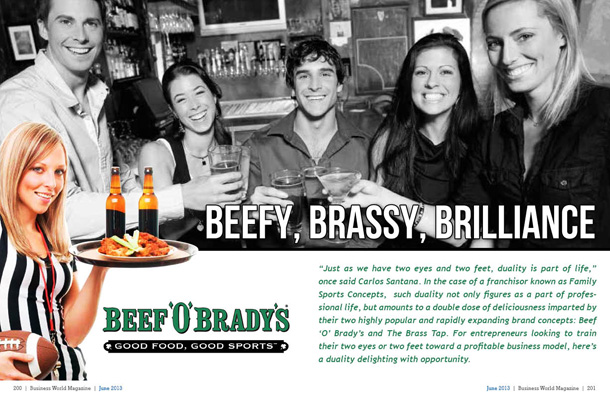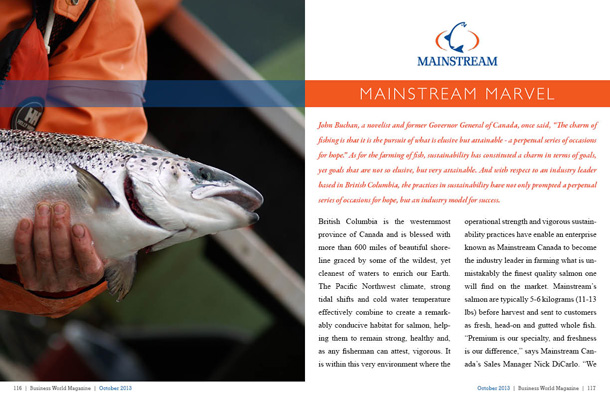
Mainstream Marvel
John Buchan, a novelist and former Governor General of Canada, once said, “The charm of fishing is that it is the pursuit of what is elusive but attainable – a perpetual series of occasions for hope.†As for the farming of fish, sustainability has constituted a charm in terms of goals, yet goals that are not so elusive, but very attainable. And with respect to an industry leader based in British Columbia, the practices in sustainability have not only prompted a perpetual series of occasions for hope, but an industry model for success.
British Columbia is the westernmost province of Canada and is blessed with more than 600 miles of beautiful shoreline graced by some of the wildest, yet cleanest of waters to enrich our Earth. The Pacific Northwest climate, strong tidal shifts and cold water temperature effectively combine to create a remarkably conducive habitat for salmon, helping them to remain strong, healthy and, as any fisherman can attest, vigorous. It is within this very environment where the operational strength and vigorous sustainability practices have enable an enterprise known as Mainstream Canada to become the industry leader in farming what is unmistakably the finest quality salmon one will find on the market. Mainstream’s salmon are typically 5-6 kilograms (11-13 lbs) before harvest and sent to customers as fresh, head-on and gutted whole fish. “Premium is our specialty, and freshness is our difference,†says Mainstream Canada’s Sales Manager Nick DiCarlo. “We are able to get fresh fish to market in 48 hours, all year round.â€
Demand for Mainstream Canada’s salmon has driven the growth of the company which currently employs more than 270 people who help annually produce some 25,000 tons of fresh salmon distributed among markets in the United States and Canada, as well as areas of Asia. More than half of its production takes place in Clayoquot Sound (near Tofino on the west coast of Vancouver Island), but the company also operates farms on the east coast of Vancouver Island (in the Broughton Islands) and near Campbell River.
In operation for more than thirty years, Mainstream Canada emerged from a series of mergers and flourishes today as a subsidiary of the Cermaq group of companies. Headquartered in Oslo, Norway (and listed on the Oslo Stock Exchange), Cermaq has a diversified and dynamic presence in major salmon farming regions worldwide. Creating values through sustainable aquaculture is the mission that underlies all of Cermaq’s operations, and that’s important because as much as British Columbia’s pristine environmental conditions have certainly contributed to the quality in Mainstream’s product offerings, there should be no mistaking that this company’s sustainability practices have been especially pivotal to its achieving of commercial success, as well as the recognition and respect it has received within its industry. As Mainstream Canada’s Managing Director Fernando Villarroel affirms, “Our goal is to be the leader in producing the highest quality farmed Atlantic salmon. We do this through sustainable aquaculture.â€
Sustainable Success
The commitment to continued improvement has endured as the foundation for Mainstream Canada’s success; fostering rare devotion in seeking means to diminish environmental impacts, expand upon collaborations with strategic partners and First Nations and achieve efficiencies that help lower operating costs. The drive for continual improvement has likewise helped Mainstream Canada fulfill its mission to advance in sustainable aquaculture practices. “We work with transparency and we engage in constructive dialogue with stakeholders to ensure the continuous improvement of our operations,†says Mainstream’s parent company Cermaq in its corporate statement on sustainability.
Mainstream Canada’s vision of sustainable aquaculture fully adheres to principles espoused in 1987 by the United Nations World Commission on Environment and Development – “Development that meets the needs of the present without compromising the ability of future generations to meet their needs.â€
Sustainable aquaculture relies on balancing environmental, social and economic concerns. Today, all acknowledge that is only through sustainable production that a foundation for long-term production can be ensured, and Mainstream Canada has consistently demonstrated the model for sustainable success.
Whether in terms of quality, environmental or food safety management or that involving occupational safety and health, Aboriginal stewardship and the implementation of best aquaculture practices, time and time again, Mainstream Canada has been conferred with distinction from third-party authorities specializing in certification and accreditation in standards that succinctly define the best within the business. Mainstream Canada was the first Canadian aquaculture company to have its Environmental Management System (EMS) certified to the international ISO 14001 EMS standard (two other management systems were certified at the same time in 2009). Two years later, Mainstream Canada became the WORLD’s FIRST to meet the Best Aquaculture Practices established by the Global Aquaculture Alliance. Mainstream Canada is also the second of any large company in British Columbia to earn the FIOSA-MIOSA Safety Alliance’s Certificate of Recognition (COR), and it remains the only salmon farming company of the province which has earned this achievement.
“Meeting these standards gives our partners and customers confidence that our salmon is safe, healthy and nutritious, and is responsibly farmed in a sustainable manner,†says Laurie Jensen, Mainstream Canada’s Communications and Corporate Sustainability Manager. “We are very fortunate to be able to work with excellent suppliers, who are dedicated to fulfilling and supporting our commitment to excellence and sustainability.â€
Operational Excellence
The salmon farming cycle begins with broodstock fish, which have been selected over many generations for superior genetics, in fact, Mainstream Canada has the longest-running selective breeding program in all of British Columbia. These fish are used to spawn and fertilize eggs to grow the next generation of farmed salmon. Mainstream grows fish from eggs in three land-based freshwater hatcheries. When the young salmon are ready for the ocean phase of their lives, they are transported to ocean farms, where they grow for 14-16 months. After they are harvested from ocean pens, the fish are processed at two processing plants and then transported to customers.
Jensen further asserts that Mainstream’s commitment to sustainability has accommodated its production of top-quality salmon, and operational excellence is evident in all aspects of the value chain:
- Quality genetic stocks: for decades Mainstream has managed a selective breeding program. This program has resulted in advances in health and growth, and a shorter life cycle for Mainstream fish.
- Top-quality smolts: Mainstream’s land-based hatcheries use the latest technology to produce healthy, strong fish ready for the ocean environment.
- Minimizing stress on fish: If fish get stressed, it can affect their health. Workers take care throughout the salmon lifecycle to minimize stress on the fish, handling them as little as possible.
- Preventative fish health approach: Mainstream Canada believes in preventative fish health. This means providing the fish with an optimal environment, nutrition and vaccination. Correct nutrition is a cornerstone of preventative fish health. Mainstream also vaccinates fish before they enter the marine environment, and screens them regularly to ensure they are in good health. Medicine is rarely used, and only when prescribed by a veterinarian.
- High-quality feed: A big part of keeping fish healthy is a nutritious diet. Mainstream’s feed supplier, EWOS, is a world leader in sourcing sustainable ingredients and producing top-quality salmon feed designed to meet the dietary needs of fish and keep them healthy.
- Quality control: The company takes the greatest care to reduce stress on fish during harvest. They are stunned, bled and put on ice in a fast, humane process. They are maintained at a cool temperature from the moment they are harvested to the moment they are delivered to Mainstream’s customers. These two processes are key to ensuring high quality fish.
Principled Partnerships
Jensen says strong working relationships with suppliers, First Nations, employees and customers have always been fundamental to Mainstream Canada. She says such partnerships “help us meet the highest standards for sustainability and enhance our capability to fulfill the growing demand for our product.â€
Among the company’s most important partnerships is a protocol agreement with the Ahousaht First Nation, whose territory includes Clayoquot Sound on the West Coast of Vancouver Island. Jensen says this partnership makes ensure that the salmon farms in Ahousaht territory meet the First Nation’s stringent standards for excellence and sustainability. Mainstream Canada was recognized for this partnership when it became the first company to achieve the Aboriginal Aquaculture Association’s Aboriginal Principles for Sustainable Aquaculture certification. This partnership has led to other significant collaborations which include current efforts to rebuild the wild salmon habitat along the Atleo River. This waterway once hosted rich runs of Coho, Chum and Pink Salmon, yet saw adverse impact from logging and commercial fishing operations. Suitable spawning grounds for the fish declined over time, yet Mainstream and the Ahousaht First Nation are now working together to restore this habitat.
Other partnerships involve pharmaceutical suppliers. Through these collaborations, Mainstream has benefitted from innovations in new vaccines that help ensure fish stay naturally healthy in the ocean environment; application essential to all in this industry.
Through it high standards for worker safety (both for employees and for suppliers), Mainstream has routinely partner with other like minded companies, bolstering the economic sustainability of firms specializing in diving, marine towing and other service. Mainstream’s success has contributed to the success of many other companies. At the same, that success has enabled Mainstream to participate in numerous initiatives that beneficially impact people’s lives. One example can be found in the company’s support and sponsorship of the Howie Meeker Special Olympics Golf Tournament, an event that provides needed funds for the Campbell River Special Olympics. One of the community’s leading coaches of Special Olympics Athletes is a man known as Dave Samson. When not nurturing and encouraging young, Special Olympians, Samson can be found tending to duties as Mainstream Canada’s Occupational Health and Safety Officer.
For all of its success, Mainstream has never wavered in its mission to embrace practices and programs that ultimately help improve the environment, improve work opportunities and excel in its stewardship of initiatives that are not simply advantageous for its business, but the community where it based. As Jensen says, it is all indicative of Mainstream’s philosophy of continual improvement.
Evolving to meet new challenges
As the marketplace changes to require more standards for seafood sustainability, Mainstream Canada took the initiative and became the first salmon farming company in the world to achieve the Global Aquaculture Alliance’s Best Aquaculture Practices (BAP) standard for salmon. Since then the company has also achieved the BAP standard for its processing facility in Tofino.
“Our commitment to continual improvement means we are constantly looking at new ways to farm more efficiently,†Jensen says.
For example, Mainstream has adopted new feeding practices and technologies that improve efficiencies and fish growth. Changes during the past decade means Mainstream can now grow one kilogram of salmon using only 1.1 kilograms of wild forage fish as feed ingredients.
As for the future, the Nobel Laureate and Economist Peter Drucker once affirmed, “Aquaculture, not the Internet, represents the most promising investment opportunity of the 21st century.†Ten years have passed since Drucker made this comment, yet his words are truer than ever today. The future is bright for Mainstream Canada. Globally, the demand for seafood is on the rise. In fact, half of the world’s seafood is now farmed. With capture fisheries at or near capacity, aquaculture is only going to grow in the next few decades, as will demand with the world’s population expected to reach 9.6 billion by 2050 according to the UN.
“We’re excited to be part of that future, providing healthy, sustainable seafood for a growing population that is becoming more and more health-conscious,†says Villarroel. “We’re proud of what we do and proud of our employees who make our success possible. We’re confident that our commitment to sustainable aquaculture will continue to distinguish us as a leader in the marketplace for many years to come.â€
Through the commitment to continual improvement, through the embracing of the highest standards in sustainability and through forging partnerships that elevate quality in environmentally, occupationally and profoundly personal degrees, Mainstream Canada, despite its name, has transitioned from the mainstream to emerge among the most excellent, and exceptional, of any in its industry.
For more information, please visit their website at: Â Mainstream Canada
Preferred Vendors of Choice:

